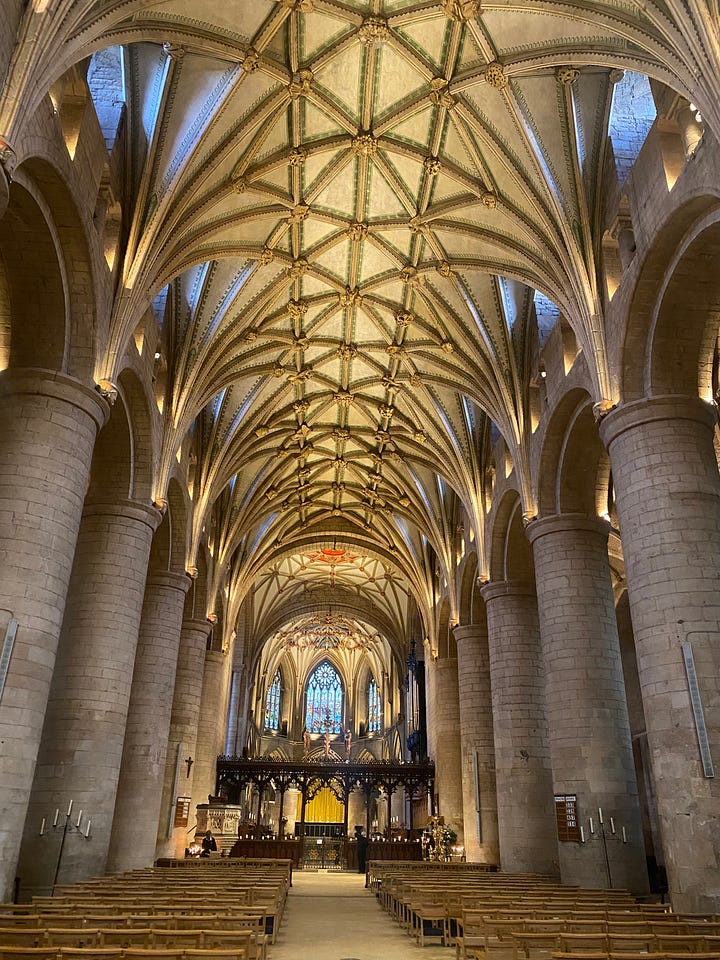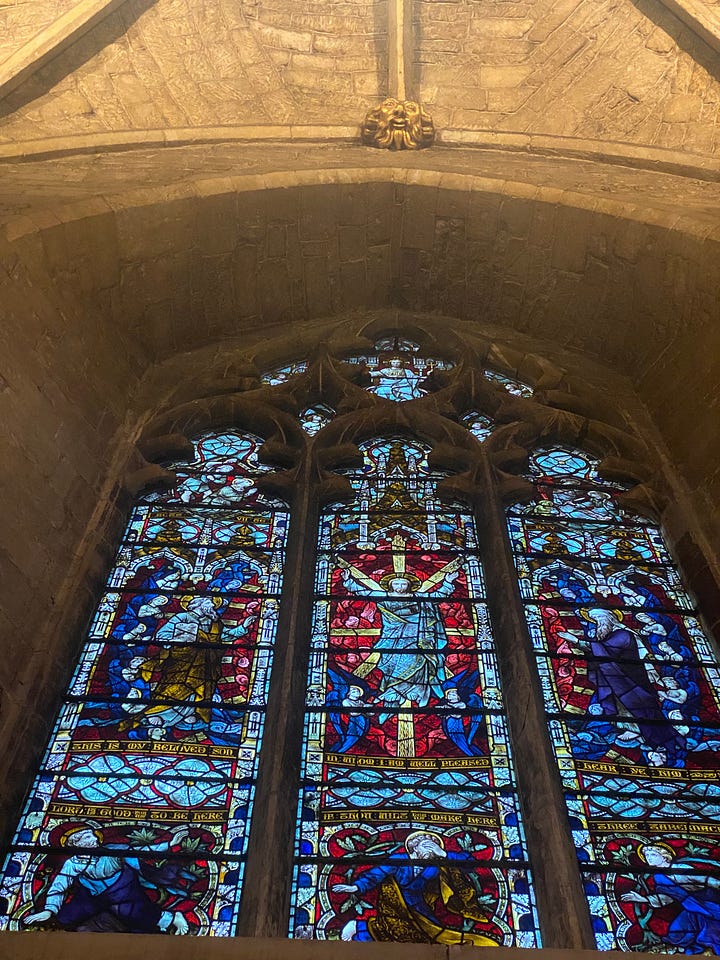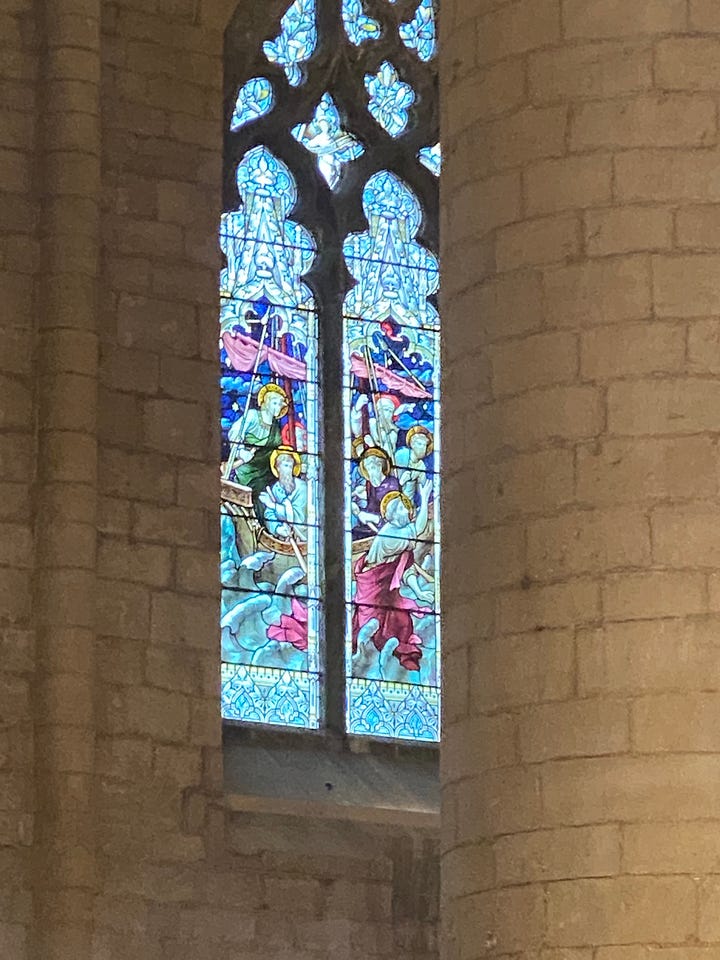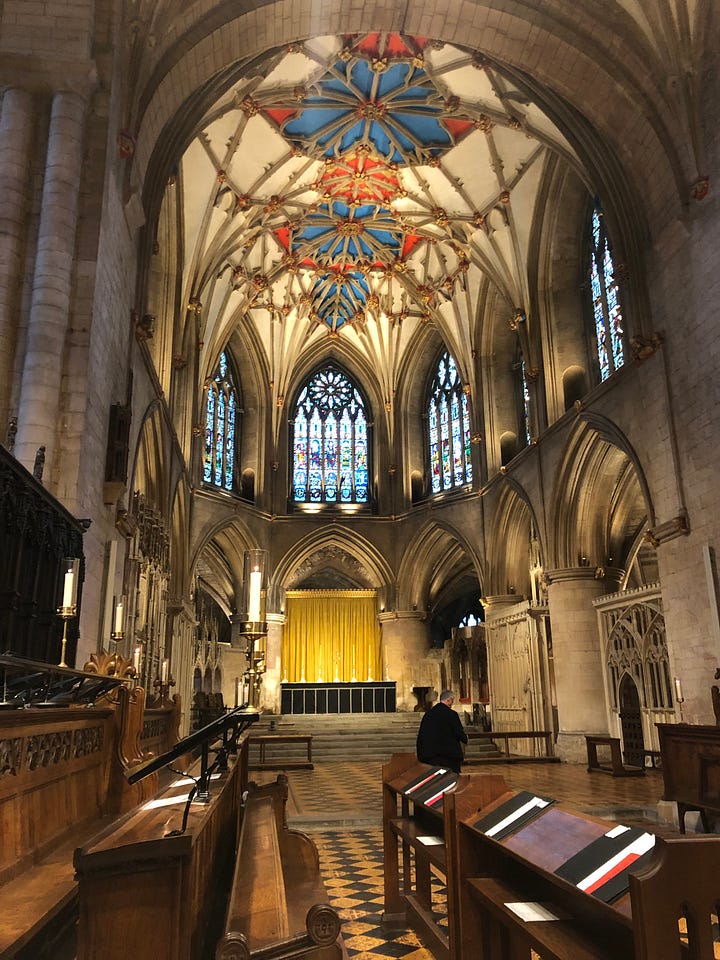The sublimity of deconstruction
& spiritual composting
It was in the Tewksebury Abbey that I experienced it - sublimity. The sun was streaming in through the stained glass windows and the silence enveloped me in an awed reverence, as I craned my neck to witness the exquisite detail on the ceiling above. Time seemed to stand still and the sublime moment stretched on.




Perfectly preserved in coloured glass, I recognized tales of Peter walking on water, the miracles of Cana, the crucifixion and ascension. I recognized the lion and the lamb ensconced in gold on the pulpit, and the 3-fold arches that I saw more often represented in my tarot cards (specifically the 3 of Pentacles). The abbey was an unfolding of all parts of me - my past and present coming into alignment.
To light a candle at the altar and be followed by the echo of my footsteps as I turned slowly in a circle, much like a dancer in the centre of a music box, was healing in ways I didn’t know I needed.
I hadn’t stepped foot in a church in over 7 years. I hadn’t expected to be on the inside of a church ever again. Yet here I was, experiencing timeless bliss within the stone walls of an 800 year-old abbey. The reverence of churches in the UK as historical monuments has been a beautifully conscious, corrective experience. There is a haunting beauty in hearing the bells rung by a bell-ringer every day on the hour (and quarter of the hour) that is undeniably sacred.
Christianity is the mythology I was raised with and it felt comforting in a familiar way to be surrounded by its folklore once again. This time, though, I didn’t leave parts of myself at the door.

In the process Mike Morrell calls spiritual composting (allowing the decay of ideologies to nurture regeneration), I have such a deep gratitude for my Christian roots introducing me to divine connection, to normalize mystical experiences and create space for spiritual practice as self-care. I’ve maintained daily routines of spiritual reflection that have expanded to include all of me and have developed a spiritual ethic & practices that invite me into deeper alignment to myself.
On the other side of deconstruction, I’m also so thankful to have left behind the dogmatism of certainty, to sit in the mystery of not-knowing. To have extricated the cycles of fear & control laden in modern religion, I discovered a self-trust and depth to intuition I never knew possible. In the release of ideology that didn’t match my ethics or values, I, in many ways, became unrecognizable. In the best possible way.
To learn more about my journey into wholeness, take a listen to the episode of Unchurchable Podcast where I talk with Kit Kennedy about love, trust and fear in the deconstruction experience, here or wherever you get your podcasts.
If you’re deconstructing, here is where I started my composting journey:
Consider what YOU think (not what you’ve been told) - take time to ask a question and sit with the question. There’s no need to rush towards answers (or certainty)
What do you think of the afterlife? Do heaven and hell actually exist?
What do you think about other religions? Do you notice similarities in teachings? What about mythologies?
What is the nature of humanity? One of depravity or eternity? Somewhere in between?
What is the inherent quality of soul or spirit in humanity? Does this exist in other beings? In elements and in the world?
What ethics and moralities align with your values? What would be your 10 commandments?
What do you think of the concept of agency and free will?
What do you think is the purpose of Life? Why are we here and why are we here now, in this life time?
What is the nature of consciousness? How did we become aware of our mortality? Do other beings hold this awareness?
What is your personal purpose in life? Do you have one? What is the nature of living? How do we know we are alive?
Is there an inherent quality or meaning in the world? Or is the world one of random order?
How do you want to practice your spirituality? Are rituals important to you?
Did a daily practice ground you? Or do you prefer to engage with practices spontaneously? When the spirit calls, so to speak. What elements of practice were enlivening for you?
There is much focus in the deconstruction journey on what we don’t believe, which is so important but then we need to ascertain what we do believe. Once the pendulum has swung one way, it needs to settle back in the middle. We need to know what we stand for after we define what we don’t stand for.
Are you an ex-vangelical?
If today’s newsletter resonates with you, you can:
Share a snippet on social media and tag me @syconiumhealingpractice
Forward this email to a friend you think would enjoy it
Follow me over on TikTok for snippets of wisdom @syconiumhealing
Join other paid subscribers for weekly Sanctuary where I’ll be sharing spiritual practices, rituals, guided meditations, moon movements and more!
It’s perfect for existentialists or post-deconstruction exvangelicals who want to explore spirituality but don’t know where to start outside of expensive crystal shops and church pews.



